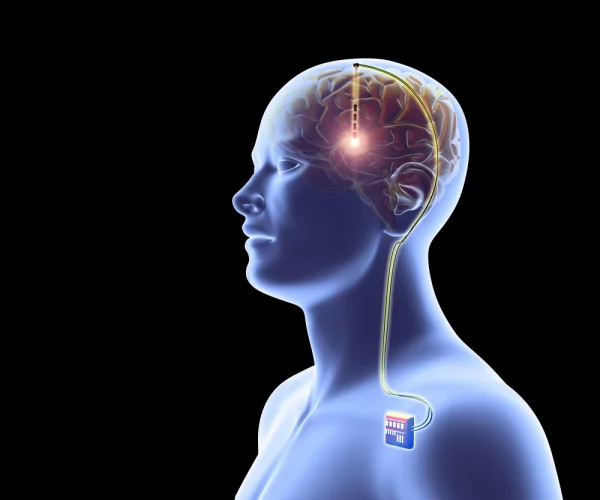In recent years, brain implant research has ushered in a revolution in the field of neuroscience, offering new hope for millions of patients facing memory problems. One of the notable breakthroughs is the brain implant technology developed by researchers at the University of Southern California (USC) and Wake Forest Baptist Medical Center. This implant not only assists but also has the potential to restore memory for individuals with neurological conditions such as Alzheimer’s, Parkinson’s, or brain injuries.
This device was developed by Ted Berger and Dong Song at the Viterbi School of Engineering, USC. The researchers created a device capable of simulating the process of transferring information from short-term memory to long-term memory, thereby helping to overcome damage in the hippocampus area – the brain region primarily responsible for memory storage and conversion. The technology uses electrodes implanted in the brain to reactivate neural signals, thereby restoring patients’ memory function. Initial testing results show that the device can predict neural signals with an accuracy of up to 90%, opening up great potential for memory restoration for patients.
“Our implant model can predict neural signals with an accuracy of up to 90%, opening up great prospects for assisting the brain in memory restoration.” – Ted Berger, Viterbi School of Engineering, University of Southern California (USC), research report published in Journal of Neural Engineering (2015).
This technology is not just a treatment method but also opens up great potential for improving memory in healthy individuals. Using computer models to predict and recreate neural signals could be applied in various fields, from enhancing learning abilities to improving memory retention in adults. This could help reduce dependence on medication and traditional treatments, instead offering devices that directly intervene in the brain to restore or enhance its functions.
“Brain implant technology is not only for treatment but could also expand its applications in fields like enhancing cognitive abilities and learning in healthy individuals.” – Ted Berger, Viterbi School of Engineering, University of Southern California (USC), research report published in Journal of Neural Engineering (2015).
The results of the implant device’s trials clearly demonstrate the progress of neuroscience. With an accuracy of up to 90% in recreating neural signals, the device not only helps restore memory for patients but could also be the key to developing methods for improving brain function in healthy individuals. This marks a major step forward in research into using technology to intervene in the brain’s complex activities, opening new opportunities for treatment and cognitive development.

The development of this brain implant technology not only brings hope to patients with neurological diseases but also opens up great potential for research aimed at enhancing human brain function. Scientists at USC and Wake Forest Baptist are continuing to refine this device, with the goal of not only treating but also improving cognitive abilities and memory, thereby improving the quality of life for individuals. This technology is a clear demonstration of the limitless potential of science in exploring and developing human intelligence.


HPX24h > Science > Enhancing Memory with Brain Implants: A New Scientific Revolution
Tagged Articles
Turning Dreams On and Off with Brain-Control Technology: A Breakthrough in Sleep Researc
Recreating the Mouse Brain in a Virtual World: The Future of Neuroscience
Can Pregnant Women Experience Temporary Memory Loss? The Secrets Behind Brain Changes During Pregnancy
The Secret of the Bee Brain: New Technology Enables Drones to Fly Independently
Top Reads from This Category
Science
The First Person to Experience Physical Sensations Through a Prosthetic Hand
Science
Discovery of a New Stem Cell: A Major Advancement in Creating Human Organs
Science
Why Cultured Meat Could Be the Future of the Food Industry
Science
New Artificial Kidney via Nanotechnology: A Revolutionary Alternative to Dialysis
Science
The Mystery of the Brain Network that Regulates Human Attention Has Been Unveiled
Science
The Secret of the Bee Brain: New Technology Enables Drones to Fly Independently
Science
Turning Snake Venom into Life-Saving Medicine: A Promising New Yeast Cell Technology
Discover New Topics
Health
Unlocking the Mystery: How the Brain Controls Body Weight
Science
Modular Prosthetic Limb Technology: Breakthrough Discovery Enhances Motion for Disabled Individuals
Fitness
Exercise – The ‘Miracle Cure’ to Awaken Overall Health
Parenting Tips
Talking to Children About Race: How to Make It Easier?
Space
The Smallest Star System with Three Exoplanets Found by NASA’s Kepler
Healthy Eating
Does Bone Broth Really Help Relieve Joint Pain and Improve Skin?
Animals
Bee Wax Bust of Nefertiti: The Perfect Fusion of Art and Nature
Parenting Tips
Discover How Japan’s Education System Creates Self-Disciplined, Responsible Students Without the Need for Pressure
Science
Enhancing Memory with Brain Implants: A New Scientific Revolution
Science
Your Body Is Not the Same as It Was 10 Minutes Ago: The Continuous Regeneration Process of the Human Body
Animals
Explaining How Mosquitoes Can Fly Through a Rainstorm
Science
Why Do Adult Brains Continue to Generate New Neurons?
Healthy Eating
Why Do We Need Fiber in Our Diet?